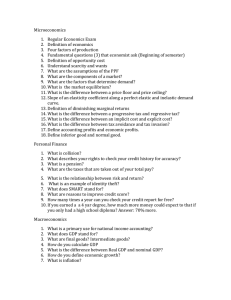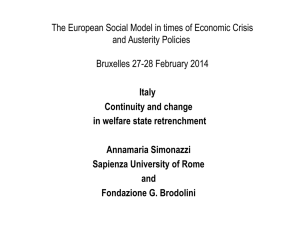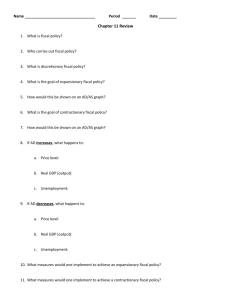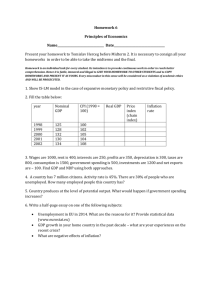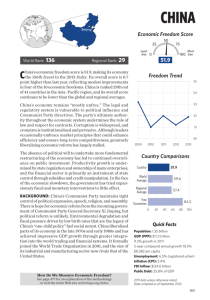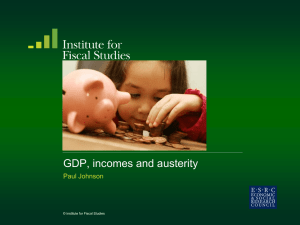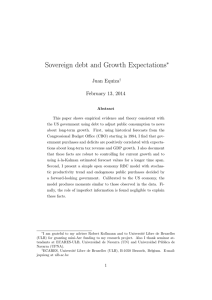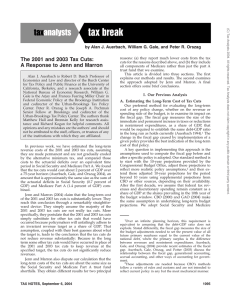The fiscal squeeze and tax and welfare changes affecting low-earning individuals
advertisement
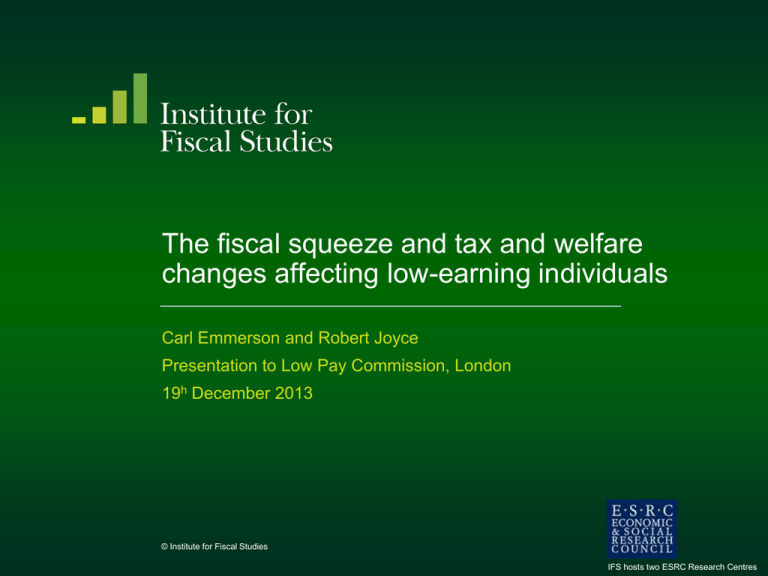
The fiscal squeeze and tax and welfare changes affecting low-earning individuals Carl Emmerson and Robert Joyce Presentation to Low Pay Commission, London 19h December 2013 © Institute for Fiscal Studies IFS hosts two ESRC Research Centres Faster growth in GDP – but only temporary Comparison of forecasts for real GDP growth and trend GDP Level of GDP (Index, actual 2009–10 GDP = 100) 120 118 116 114 GDP (Mar 2013) GDP (Dec 2013) Potential ("trend") GDP - March 2013 Potential ("trend") GDP - December 2013 112 110 108 106 104 102 100 © Institute for Fiscal Studies Sources: OBR; Author’s calculations. The cure (December 2013): 10.1% national income consolidation over 9 years (£166bn) Dec 2013: 8.6% national income (£141bn) hole in public finances 11 Other current spend Debt interest Benefits Investment Tax increases Percentage of national income 10 9 8 7 6 46% done 5 86% 4 3 2 1 0 2010–112011–122012–132013–142014–152015–162016–172017–182018–19 © Institute for Fiscal Studies Sources: HM Treasury; OBR; Author’s calculations. Tax cuts coming up • Personal income tax allowance up £250 in real terms to £10k – annual real gain of up to £50 – Brings real increase over this parliament to £2,415 – Less focused on very lowest earners now that PA is much higher – 65% of gains can be lost via reduced housing benefit; and typically around 20% via reduced council tax support (depends on local taper rate) – Same issue will apply to wider group under Universal Credit (65% taper) • More real cuts to fuel duty and council tax. – NB council tax cuts now benefit more low-income people: 70% of English local authorities require all working-age people to pay some council tax – Minor effects on work incentives © Institute for Fiscal Studies Welfare cuts coming up • Continuation of 3-year policy: most benefits/tax credits increased by 1% in April 2013, 2014 and 2015 – 1.7% real cut in 2014-15; 4% real cut over the 3 years – Pensioners and more severely disabled largely protected • NB maximum Housing Benefit entitlements for private sector renters included in 1% rule – bigger impact in areas with higher rent growth • And after 2015 these entitlements will be CPI-indexed (not rent-indexed) • Affects in-work and out-of-work benefits – Mixed impacts on work incentives © Institute for Fiscal Studies Universal Credit (UC) • Will integrate 6 of 7 existing means-tested payments into one • Schedule for UC roll-out delayed – Only 0.4 million (not 4.5 million) on UC by 2015-16 – Complete roll-out by 2017-18 • Less noticed is that planned generosity of UC to low earners has been significantly reduced by lowering the ‘work allowances’ – Generally starting at lower level, and frozen in cash terms until 2017 – E.G. Work allowance for couples with 1 child to be 25% lower in April 2017 than previously planned - £1,360 less UC (in current prices) if net annual pay of £11k (assumes no support for housing costs) © Institute for Fiscal Studies Impact of tax and benefit reforms January 2010 - April 2015 inclusive, as if Universal Credit fully in place 4% 2% Change in net income 0% -2% -4% -6% Households with children -8% Pensioner households -10% Working-age without children -12% -14% Poorest 2 3 4 5 6 7 Income Decile Group © Institute for Fiscal Studies Fuel duties modelled at average 2015-16 level. Assumes full take-up of means-tested benefits and tax credits. 8 9 Richest All
